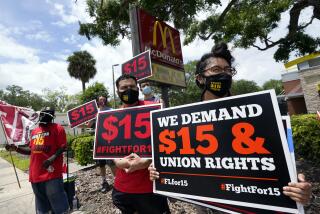IMF Chief Faces Battle in Pushing for Seoul Layoffs
- Share via
SEOUL — When International Monetary Fund Chief Michel Camdessus meets today with the heads of South Korea’s two largest labor unions, he will face the most formidable organized opposition to the IMF’s controversial efforts to reform the beleaguered Korean economy.
The militant Korean unions, charging that they are being forced to bear the brunt of the IMF’s $60-billion bailout program, have threatened a nationwide strike if the Korean National Assembly passes a law this week backed by the IMF that would legalize layoffs in Korea’s ailing financial sector.
Passage of the measure has become a key test for foreigners interested in investing in Korea but worried about the incoming government’s willingness to implement the tough measures required by the IMF as a condition of its support package.
“Why should we be sacrificed?” asks Lee Young Ah, 33, an official of the Korean Federation of National Automobile Unions.
Analysts fear such social turmoil would endanger Korea’s fragile economy, which has only recently begun showing signs of improvement. While other markets in Asia continued their free-fall Monday rocked by the political crisis in Indonesia and a major investment house collapse in Hong Kong, Korea’s stock market ended the day up 3.5% at 456.2 points.
“If the union takes a strike action, then the overseas financial institutions will think our economy is still unstable, and they cannot invest money into our financial markets,” said Lee Pyoung Hoon, a research fellow with the Korea Labor Institute. “That would cause great tragedy to all Korean people.”
But in a meeting Monday with Camdessus at his home, President-elect Kim Dae Jung gave his assurance that the controversial layoffs bill would be passed. The National Assembly has scheduled a three-day session to address the proposed legislation starting Thursday.
Korea’s unions, whose members fear massive job cutbacks if the law is passed, are battling to protect a system of worker protections dating back to the Korean War that make it difficult to legally fire workers unless a company is bankrupt.
South Korea, whose currency and stock markets were badly hammered in the Asian contagion that began sweeping through the region last summer, narrowly averted a financial meltdown last week when international bankers agreed to roll over $20 billion worth of short-term debt coming due at the end of January.
But private lenders are waiting to see whether the government acts on the labor law before agreeing to extend funds to cover an additional $15 billion in short-term debt, according to Cho Se Hyong, acting president of Kim’s National Congress for New Politics party. Korea’s total privately held foreign debt is estimated at $153 billion.
Cho remains optimistic that Korea’s labor leaders, many of whom supported Kim during his days as a dissident leader, can be persuaded to drop their opposition to the layoff law.
“A certain degree of sacrifice is inevitable in this national crisis,” he said. “I am confident the union will support it.”
In his meeting today, Camdessus is expected to tell leaders of Korea’s two largest unions--the Federation of Korean Trade Unions and the more militant Korean Confederation of Trade Unions--that their country’s financial pressures will ease significantly in the coming weeks only if the government presses forward with the IMF-mandated reforms.
In addition to the relaxation of labor laws, the IMF is seeking budget cutbacks, removal of laws hindering foreign investment and a dismantling of Korea’s powerful chaebol, or conglomerates.
But Pae Sok Bum, acting president of the 600,000-member Korean Confederation of Trade Unions, said Monday the labor unions will not stand for workers bearing the brunt of economic downsizing while the government and business leaders responsible for the economic crisis escape unscathed.
“The government should not take advantage of the IMF crisis to suppress workers,” he said.
Pae warned that the unions will follow through with their threats to shut down the nation’s factories if the law is passed.
But Korean labor experts are not convinced union leaders could drum up widespread support for a strike among Korean workers fearful for their jobs and their country.
They believe many Koreans share the views of Walter Choi, a 37-year-old trading company employee, whose sympathies for the unions are outweighed by his belief that widespread layoffs and closures of unprofitable institutions are needed to get Korea’s battered economy back on track.
“Our economic situation will get worse but it is necessary,” he said.
*
Chi Jung Nam of The Times’ Seoul bureau contributed to this report.
More to Read
Sign up for Essential California
The most important California stories and recommendations in your inbox every morning.
You may occasionally receive promotional content from the Los Angeles Times.













